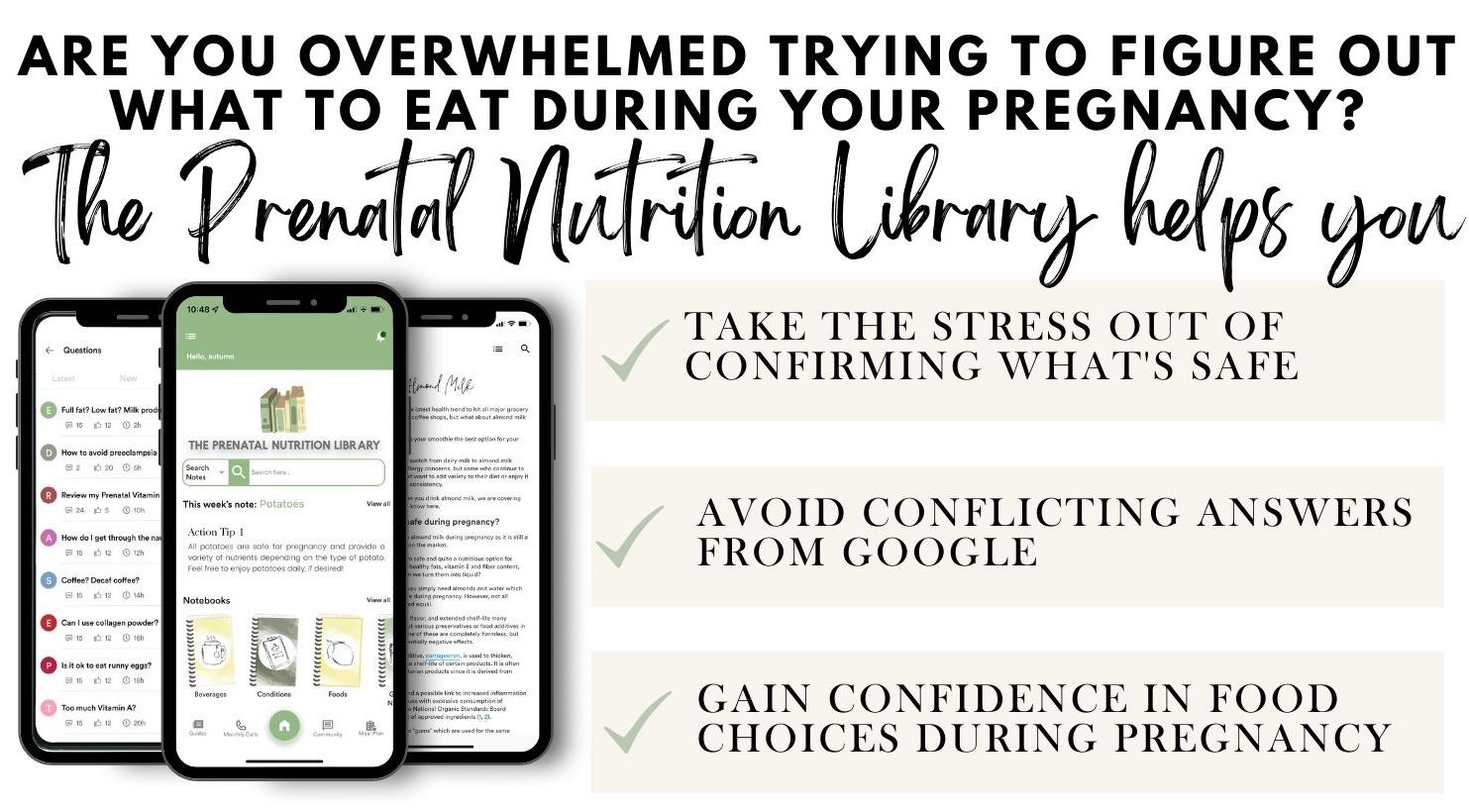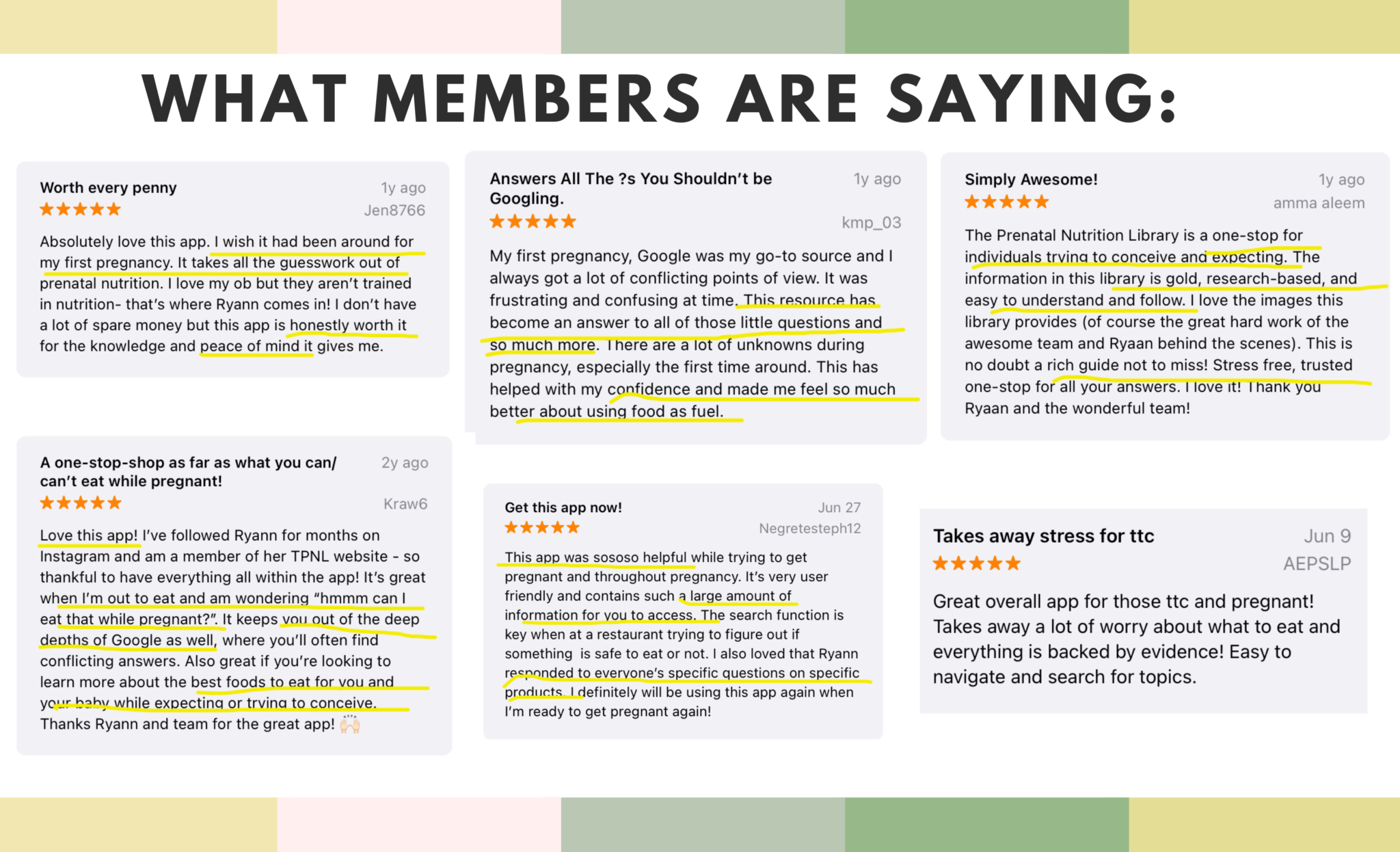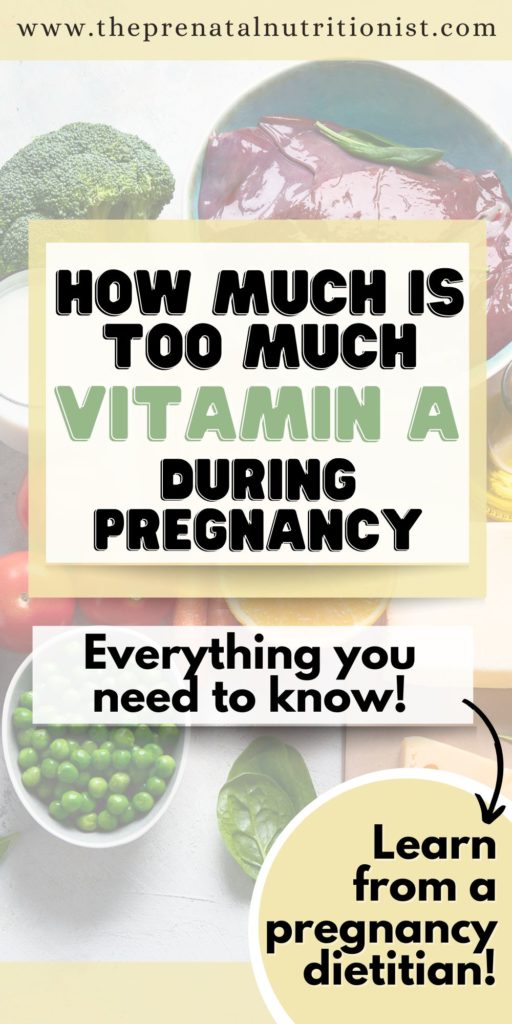
As a pregnant woman and mom-to-be, ensuring you get all the right nutrients is a full-time job. With that in mind, today, we’re talking about all things vitamin A. There is misinformation out there regarding vitamin A intake during pregnancy. But it’s important to know vitamin A is a necessary and essential vitamin for a healthy pregnancy!
Vitamin A is important for keeping you and your baby feeling your absolute best. It supports vision health, the immune system, and your little one’s overall growth and development.
The good news is that vitamin A can be found in various foods. Its deficiency is uncommon in developed countries like the United States. Eating plenty of orange vegetables like carrots and sweet potatoes, dairy products, eggs, meat, and even moderate amounts of liver will help you meet your needs. It’s also important to choose a prenatal vitamin with vitamin A and, ideally, at least some active vitamin A. This will help ensure you’re hitting your daily requirements without thinking about it.
But here’s the thing: it’s true that getting too much vitamin A is possible. If you start going overboard with vitamin A supplements or eating high amounts of organ meats, you can be at risk of consuming too much vitamin A.
That’s why I’m dedicating this post to discussing how much vitamin A is too much for pregnant women.
View this post on Instagram
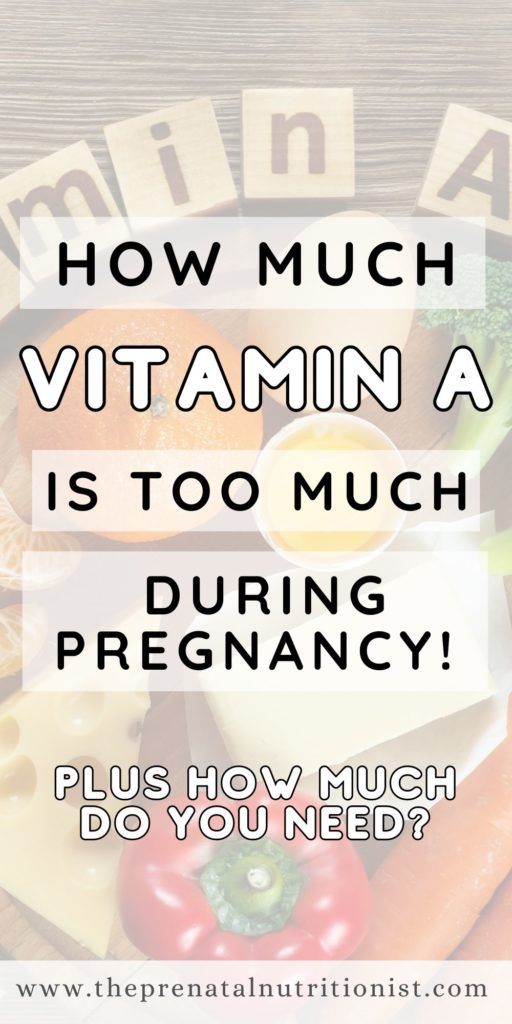
How Much Is Too Much Vitamin A During Pregnancy?
The recommended dietary allowance (RDA) of vitamin A for pregnant women is 770 micrograms RAE/day. This can be met through a combination of supplementation and by eating enough through food while pregnant.
There is a risk of consuming too much vitamin A. Too much vitamin A can be harmful during pregnancy. However, this is only seen when taking too much retinol in supplement form. This means you can’t get too much of the beta-carotene form of vitamin A in plant foods like sweet potatoes, spinach, and carrots. Unless supplementing with retinol or eating a lot of liver/organ meat, it’s unlikely you’ll overdo it.
The upper limit for pregnant women’s vitamin A (retinol) is 3000 mcg RAE/day (10000 IU).
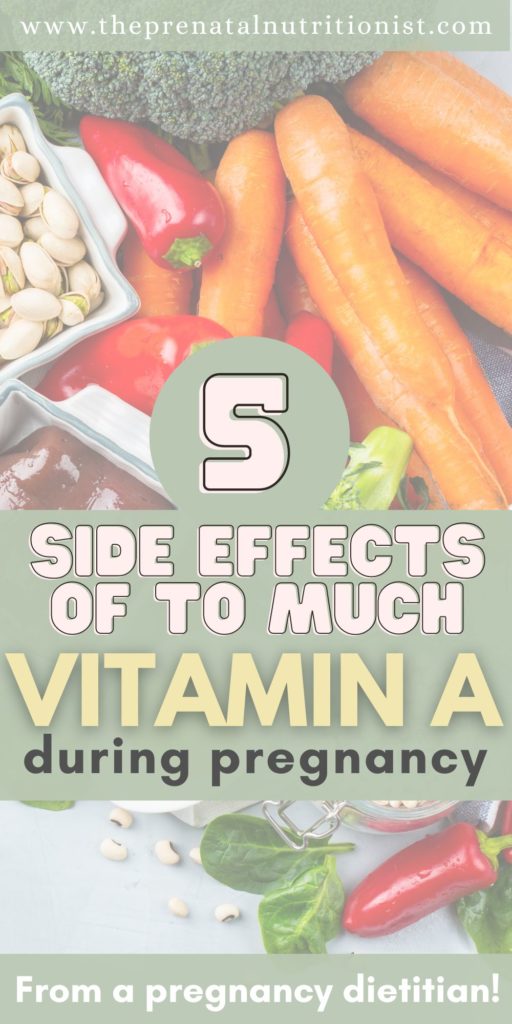
What Are The Side Effects of Too Much Vitamin A During Pregnancy?
Remember, vitamin A is essential for a healthy pregnancy. Below is a list of potential side effects that can happen with high intakes of vitamin A. The most important things I’d keep in mind are ensuring you’re not supplementing with too much retinol and, if you’re eating liver, consume it in moderation, up to a few ounces per week.
You can’t get too much beta-carotene, the plant-based form of vitamin A, and it’d be hard to overdo the retinol (animal foods) form of vitamin A without supplementing with too much retinol or consuming a lot of organ meat.
Birth Defects and Developmental Abnormalities
The first trimester, when all your baby’s vital organs are forming, is a critical time. If you consume more than 10,000 IU per day of vitamin A, the upper limit for vitamin A, there is an increased risk of birth defects for baby. Birth defects can affect the baby’s central nervous system, heart, and facial features.
Remember, excessive intake of retinoids could lead to serious complications. Retinoids are an umbrella name for a group of precursor vitamins A, like retinol, retinoic acid, and retinyl ester, which are obtained from animal sources. Examples include eggs, organ meat, fish, and dairy products. On the other hand, the other form of vitamin A is carotenoids, which are obtained from plant sources like fruits and veggies.
Liver Toxicity
High levels of vitamin A can lead to liver toxicity in pregnant women. The liver is responsible for processing and storing vitamin A. But if we overload it, it can lead to some serious symptoms like nausea, vomiting, jaundice, abdominal pain, and liver damage.
Increased Risk of Miscarriage
High intake of vitamin A, especially from supplements or animal sources, has been linked to a higher risk of pregnancy loss. Avoid intakes of vitamin A over the upper limit of 10,000 IUs daily.
Bone Abnormalities
Excessive vitamin A could interfere with normal bone development in the fetus, leading to reduced bone density and skeletal malformations. So, monitoring your supplements and organ meat intake for a healthy pregnancy is important.
Hypervitaminosis A
Chronic high doses of vitamin A or a few mega-high doses can lead to a condition called hypervitaminosis A, which could lead to symptoms including nausea, vomiting, headache, blurred vision, and dizziness. This could be detrimental for both mother and baby.
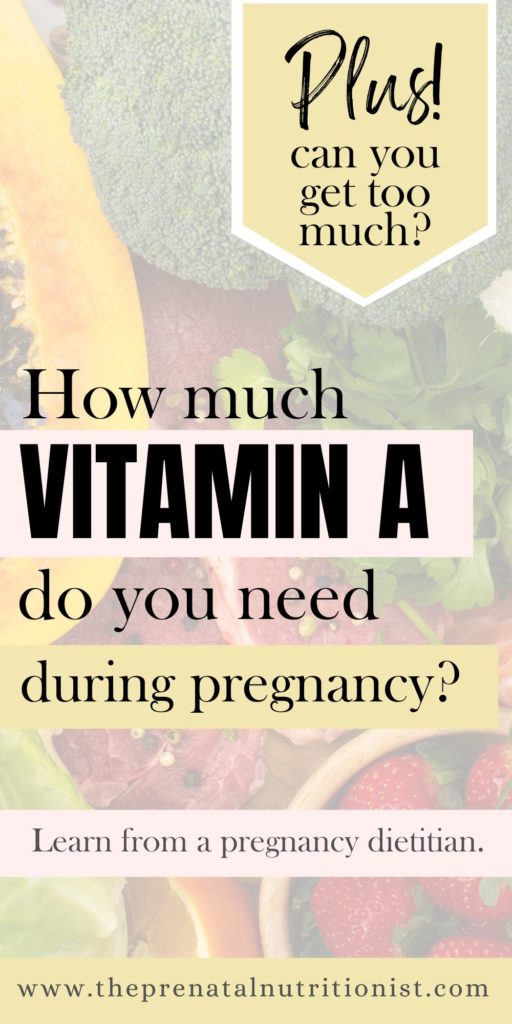
How Much Vitamin A Does A Pregnant Woman Need?
The recommended daily intake can vary slightly depending on factors like age and stage of pregnancy. The general guidelines say pregnant women should aim for at least 750 to 770 micrograms of vitamin A per day, measured in vitamin A retinol activity equivalents (RAE). This can be met through food or a combination of food and supplementation.
Below are factors affecting vitamin A needs:
Age
The recommended daily amount (RDA) for 14-18 year olds is 750 mcg RAE/day when pregnant. For those 19 years and older, you should consume 770 mcg RAE/day during pregnancy.
Stage of Pregnancy Journey
The need for vitamin A may be slightly higher in the third trimester of pregnancy compared to earlier stages of pregnancy. Additionally, if you choose to breastfeed after birth, vitamin A requirements further increase.
Health Conditions
Individual health conditions can affect how much vitamin A we need during pregnancy. In individuals with thyroid disorders, particularly hypothyroidism, there may be alterations in the absorption and metabolism of nutrients, which can affect the utilization of vitamin A. This could lead to an increased or decreased need for vitamin A. Work closely with your healthcare provider to adjust your needs.
Dietary Sources
If you’re a mother-to-be who incorporates organ meat, like beef liver, into your diet, you may meet vitamin A needs through food alone. Be sure to consume these foods in moderation to avoid exceeding the upper limit for vitamin A during pregnancy.
Supplementation
Be sure to assess and review your supplement choices to determine how much (if any) retinol you consume daily.
Do You Need Vitamin A Supplementation During Pregnancy?
Any supplement choice during pregnancy requires an individualized approach. It’s not a one-size-fits-all kind of deal. Your supplement needs depend on your diet, labs, health status, and health history.
A food-first approach is always recommended! Include plenty of vitamin-A foods in your pregnancy diet, such as salmon, herring, eggs, sweet potato, spinach, and carrots. If someone does not eat meat or eats minimal meat, I also encourage choosing a prenatal vitamin with at least some active vitamin A (retinol) .
A separate vitamin A supplement is not necessary for most individuals during pregnancy. If it is needed, it would need to be used very cautiously. Be sure to talk with your healthcare provider if there’s a reason you’re considering taking a separate vitamin A supplement.
The bottom line is that vitamin A is an essential nutrient for pregnancy, and it’s important to incorporate plenty of food sources. Be sure to work hand-in-hand with your healthcare team. They’re the ones who can take a close look at your diet, your health history, and everything in between. That way, they can give you personalized guidance for your unique situation!
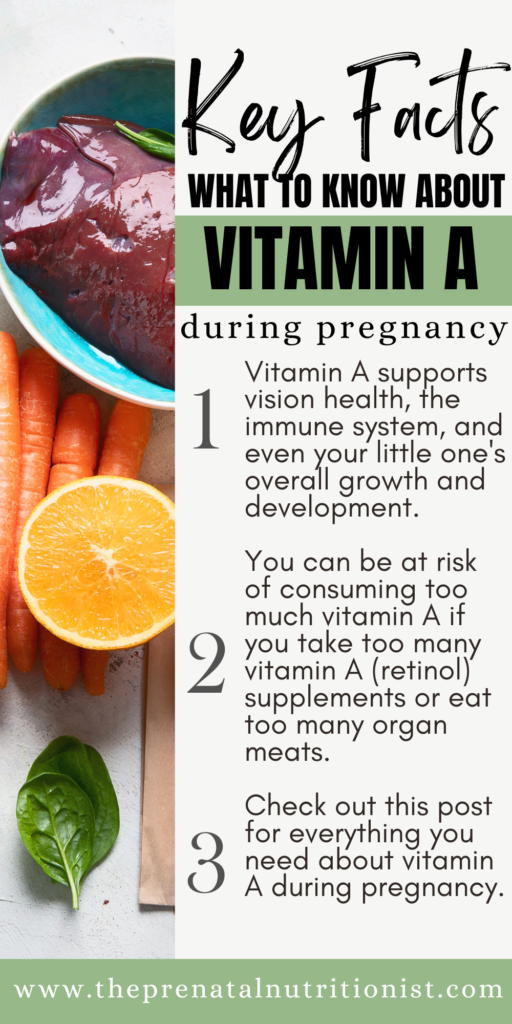
Vitamin A is an essential micronutrient during pregnancy, but it is possible to get too much.
Vitamin A is an important nutrient for pregnancy. While it’s possible to overdo it, this happens only with high liver intake or excess supplementation with the retinol form of vitamin A.
The most important thing is embracing a well-rounded, balanced lifestyle that puts wholesome, nourishing foods front and center. Supplements can be a great complement, but they’re just one piece of the puzzle regarding prenatal nutrition.
That’s why I’m so excited to tell you about The Prenatal Nutrition Library, also known as TPNL. Our pregnancy dietitians are dedicated to empowering pregnant people with all the knowledge and resources they need to make educated food and supplement choices during pregnancy. No more guesswork; just evidence-based guidance available at your fingertips with our mobile app to keep you and your little one thriving.
If you’re ready to take your prenatal nutrition game to the next level, you’ve got to check out our Free 1-Week Sample Meal Plan. It’s expert-crafted by pregnancy dietitians, and let me tell you, the meals are not only nourishing but downright delicious, too. You won’t have to worry about planning meals for a full week! See you there!



